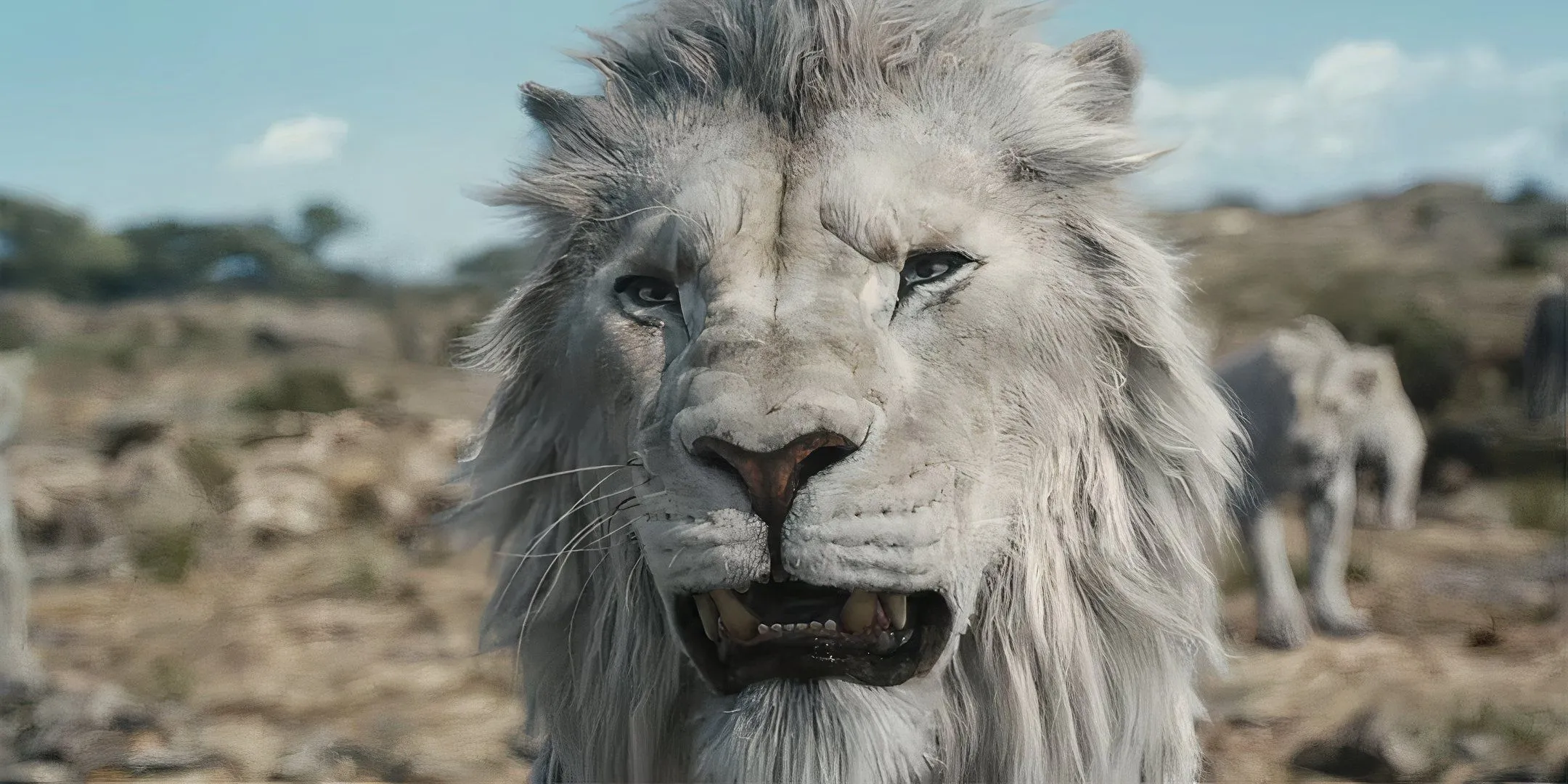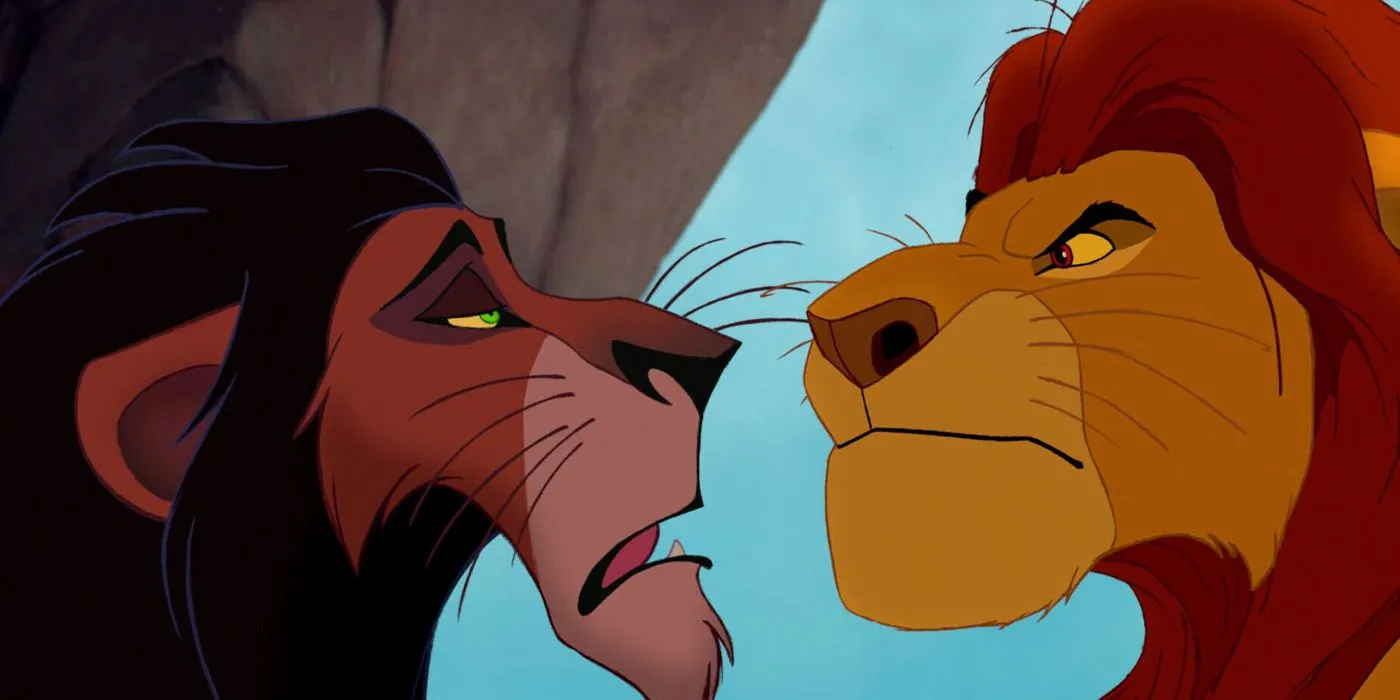
Warning: Spoilers ahead for Mufasa: The Lion King.
Unveiling Scar’s Origins
Mufasa: The Lion King delves into the backstory of Scar, revealing that he was not always known by this name. Initially called Taka, he is introduced as the brother of Mufasa and the son of Queen Eshe and King Obasi. The journey begins when Mufasa is separated from his parents during a flood. It is here he encounters Taka, who heroically saves him from an attack by crocodiles.
The bond between Taka and Mufasa deepens as they grow up together, becoming brothers in spirit despite not sharing the same blood. This connection faces turmoil with the arrival of the Outsiders, a faction of white lions led by the formidable Kiros. Taka’s jealousy, particularly over Mufasa’s relationship with Sarabi, drives him into a dangerous alliance with Kiros. This alliance results in catastrophic consequences, including the destruction of Obasi’s pride and the hunting of both brothers.
The Dramatic Climax: Taka’s Sacrifice
How Taka Earns His Scar

In a pivotal moment, Taka’s sacrifice for Mufasa occurs during a confrontation with Kiros. As Kiros prepares to eliminate Mufasa, Taka leaps into action, taking the deadly blow himself and earning his scar in the process. This defining action illustrates Taka’s internal conflict; despite his jealousy, he chooses to protect the brother he loves. This is not the first time Taka saves Mufasa; soon after, he rescues him again during a cave-in that leads to Kiros’s demise.
Taka’s Transformation: Becoming Scar
The Fate Decided by Mufasa

After the Outsiders are vanquished, Mufasa ascends the throne as King, determining Taka’s future. Mufasa graciously offers Taka a place within his kingdom. However, after Taka’s earlier betrayal, Mufasa states he will no longer refer to him by his given name. Instead, Taka suggests the name Scar to symbolize his betrayal, a decision that Mufasa reluctantly accepts. This name change becomes an enduring reminder of their tumultuous relationship, perpetuating the tension that underlies their brotherhood.
Comparing Scar’s Origins Across Narratives
Similar Narrative Arcs

In contrast with The Lion King, where Scar’s character is more straightforwardly depicted as a power-hungry brother, Mufasa: The Lion King offers a richer, more complex portrayal. Scar’s previous identity as Taka and the jealousy stemming from Mufasa’s favored position were explored in depth in The Lion King: Six New Adventures, particularly in the story “A Tale of Two Brothers.” This adaptation similarly chronicles Taka’s feeling of betrayal stemming from jealousy, but nuances the narrative by showing his connections to Mufasa beyond mere rivalry.
| Story Title | Author |
|---|---|
| “A Tale of Two Brothers” | Alex Simmons |
| “Nala’s Dare” | Joanne Barken |
| “Vulture Shock” | Judy Katschke |
| “A Snake in the Grass” | Leslie McGuire |
| “Follow the Leader” | Page McBrier |
| “How True, Zazu?” | Leslie McGuire |
Enhancing Scar’s Narrative in Mufasa: The Lion King
A Deeper Understanding of Their Relationship





Mufasa: The Lion King intricately enhances Scar’s story by exploring the complexities of the relationship between Taka and Mufasa. Whereas prior narratives suggested Scar’s malevolence stemmed solely from his desire for power, this prequel showcases moments where Taka actively protects Mufasa, even at the risk of his own desires. Mufasa, recognizing his brother’s insecurities, attempts to uplift Taka, illustrating a bond that is significantly more profound than originally presented.
The tragic irony is highlighted as Taka, despite repeatedly saving Mufasa, ultimately betrays him. This contrast amplifies the emotional weight of Scar’s eventual treachery, as Mufasa, conditioned by their shared past, anticipates his brother’s loyalty during his final moments. Mufasa’s decision to name Taka “Scar”serves as a poignant reminder of their intertwined fates, and while it speaks to Taka’s acknowledgment of past failures, it also casts a shadow on the fairness of the title, considering its origin lies in his acts of redemption.
The prequel therefore enriches the narrative landscape of Scar, cementing the bond and division between the brothers in a way that leads naturally to Scar’s eventual downfall, while simultaneously highlighting the deep-seated regret and tragedy that percolates through their history.




Leave a Reply